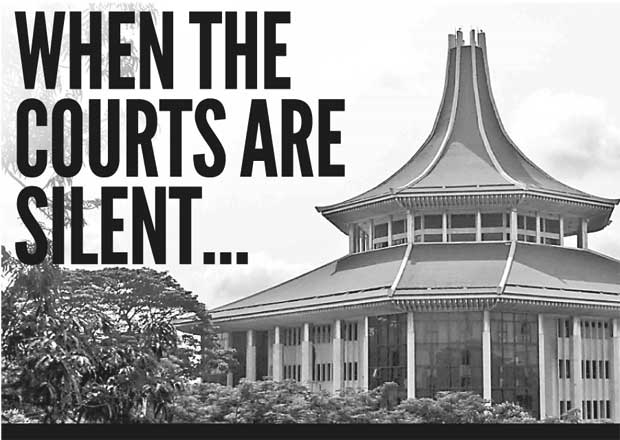Reply To:
Name - Reply Comment
Last Updated : 2024-05-09 00:28:00

 he injunction order handed down against the public screening of Prasanna Vithanage’s latest movie Silence in the Courts has opened up space to question the function of Justice in Sri Lanka. The movie is said to be based on a true story about a Magistrate suspected of sexually abusing a woman as a favour for releasing her husband from remand custody. With the Injunction Order, there has been increased publicity about this issue even before the wider public have seen the actual movie. Much of the critical debate surrounding the movie has tended to focus on the censorship of the film and while this is an important question, we believe the silencing of Silence in the Courts offers us an opportunity to enter a much larger debate about the function of justice in Sri Lanka. Therefore, in this article we want to examine the nature of the methods used by citizens of this country to seek justice, when the courts are unresponsive to their pleas for redress.
he injunction order handed down against the public screening of Prasanna Vithanage’s latest movie Silence in the Courts has opened up space to question the function of Justice in Sri Lanka. The movie is said to be based on a true story about a Magistrate suspected of sexually abusing a woman as a favour for releasing her husband from remand custody. With the Injunction Order, there has been increased publicity about this issue even before the wider public have seen the actual movie. Much of the critical debate surrounding the movie has tended to focus on the censorship of the film and while this is an important question, we believe the silencing of Silence in the Courts offers us an opportunity to enter a much larger debate about the function of justice in Sri Lanka. Therefore, in this article we want to examine the nature of the methods used by citizens of this country to seek justice, when the courts are unresponsive to their pleas for redress.
The important conversation that has emerged after the controversy over Silence in the Courts highlights the crucial role the media plays as an alternative method of seeking justice. Almost all the major television channels have their own segments where the public can make complaints about the  injustices that they face. More recently, there has also been an increased reliance on social media to highlight the daily experiences of injustice faced by the common person. This reliance speaks to a way of seeking justice that bypasses the unnecessary trouble that people must endure in pursuing justice through the ‘proper’ mechanisms. In other words, in the absence of faith in the judiciary, it is possible to notice an increasing reliance on the media as a mediator between Police and the citizen. However, as to whether the media’s intervention promotes or hinders the pursuit of justice remains an open question.
injustices that they face. More recently, there has also been an increased reliance on social media to highlight the daily experiences of injustice faced by the common person. This reliance speaks to a way of seeking justice that bypasses the unnecessary trouble that people must endure in pursuing justice through the ‘proper’ mechanisms. In other words, in the absence of faith in the judiciary, it is possible to notice an increasing reliance on the media as a mediator between Police and the citizen. However, as to whether the media’s intervention promotes or hinders the pursuit of justice remains an open question.
Traditional practices like Polgasima (breaking coconuts), Miris Ambarima (grinding chilli), Dehi Kapeema (cutting lime) have been popularly recognized cultural practices for a long time. In fact, despite the establishment of a ‘proper’ ecosystem for a functioning legal system, these traditional practices continue to be very popular even today. People also spend a lot time and money on these practices. Interestingly, people turn to these practices not so much as an alternative but as a complementary corollary to the function of justice. For example, news broke recently of Police seeking spiritual assistance from Buddhist monks to reduce road accidents in Mawathagama. This suggests that even Police officers appear to have far more faith in spiritual practices than in actual Police work. The co-existence of these traditional/ spiritual practices with modern/ secular law enforcement mechanisms can be read as another indication of the lack of faith in Sri Lanka’s justice system. The persistence of these practices suggests that many people in the country, including the Police, believe that while modern judicial systems are useful, they are never entirely reliable. Therefore, many people feel it would be best to have a spiritual/ traditional fall-back option in the likely event that these mechanisms fail.
Another method of seeking justice that has become increasingly prevalent is visible in the conversations about the use of summary killings that emerged recently. For example, when the suspects in the killing of Sivaloganathan Vithiya were produced in the Jaffna High Court last year, the protesters who had gathered outside, stoned the court demanding that her killers be handed over to them. These protesters believed that punishing these alleged perpetrators themselves was the best way to deliver justice and avoid a hopeless legal system.
If this incident may appear to be extreme, consider how people tend to react when a thief is captured in their neighbourhood. More often than not, the thief is tied up and beaten by the people in that area instead of being handed over to the Police. Many people feel that making a complaint to the Police is an unnecessary trouble and can often result in further injustice to the party making the complaint. Therefore, there appears to be far more faith in the capacity of a mob to deliver justice than mechanisms such as the Police and the Judiciary.
Another mechanism commonly adopted is to access justice through the mediation of a community leader. There are, broadly speaking, two kinds of community leaders. One set of these leaders are the traditional, law-abiding elite like monks, school principals or other respected people in a village. These traditional leaders have generally been viewed as useful interlocutors when accessing judicial mechanisms at village-level. The popular expectation is that the meditation of these leaders would be a more efficient and effective means to ensure justice.
A more recent trend that is rooted in the changing social, cultural and economic dynamics of the country is the increasing transference of the symbolic capital of these traditional community leaders to a new breed of leaders emerging from the community. This emerging breed of community leaders is increasingly drawn from a business class composed of prominent drug traffickers, kassipu mudalalis or contractors in the village. This new business class seem to offer even more efficient and effective routes for the community to access justice.
These individuals who, by virtue of their racketeering, have had to engage extensively with the Police and the legal system seem to have the knowledge, experience, and contacts to aid their fellow citizens, who are seeking justice. In a lot of areas, it is these people, who are viewed as ‘law breakers’, who are often perceived to be a more effective route to accessing justice. In return for supporting people’s quests for justice, these ‘law breakers’ earn legitimacy in their communities and this legitimacy gives them security in their respective areas. Thus, quite paradoxically, the passiveness of the legal system encourages the active engagement of citizens with law breakers in order to access justice.
As this essay shows, the expression of the desire for justice among Sri Lankans takes many forms. Some choose to sit on a wooden bench in a court on innumerable days for long hours. Others spend the entire night at a Devalaya to seek divine intervention for the injustice they face. Amidst these continued demands, people continue to experience delays and failures, which have led them to question the capability and the commitment of state institutions to deliver justice.
In spite of this failure of State mechanism to satisfy the demands of the average citizen, his/her aspiration for justice is never diminished. Faced with the incapacity and incapability of State mechanisms to provide justice, the average person reconciles his/her aspiration for justice by increasingly exploring alternative and/or complementary methods to pursue justice. Therefore, the debate over the release of Silence in the Courts should not be limited to questions of censorship or freedom of expression. Instead, it is an important invitation for a broader conversation about how we want justice to function in Sri Lanka. Without this broader conversation, the real challenge posed by the work of Victor Ivan and Prasanna Vithanage will continue to be unaddressed.

Add comment
Comments will be edited (grammar, spelling and slang) and authorized at the discretion of Daily Mirror online. The website also has the right not to publish selected comments.
Reply To:
Name - Reply Comment
US authorities are currently reviewing the manifest of every cargo aboard MV
On March 26, a couple arriving from Thailand was arrested with 88 live animal
According to villagers from Naula-Moragolla out of 105 families 80 can afford
Is the situation in Sri Lanka so grim that locals harbour hope that they coul
07 May 2024 - 2 - 1612
06 May 2024 - 4 - 1317